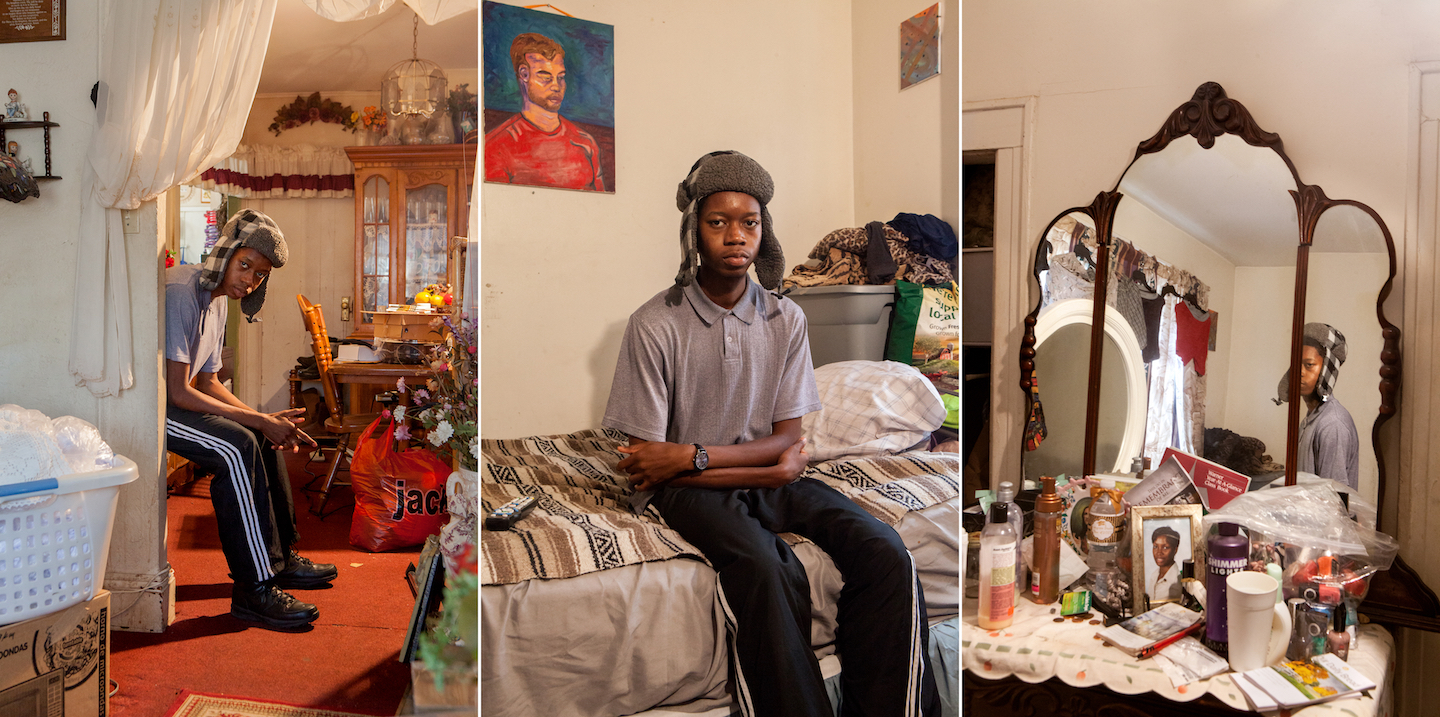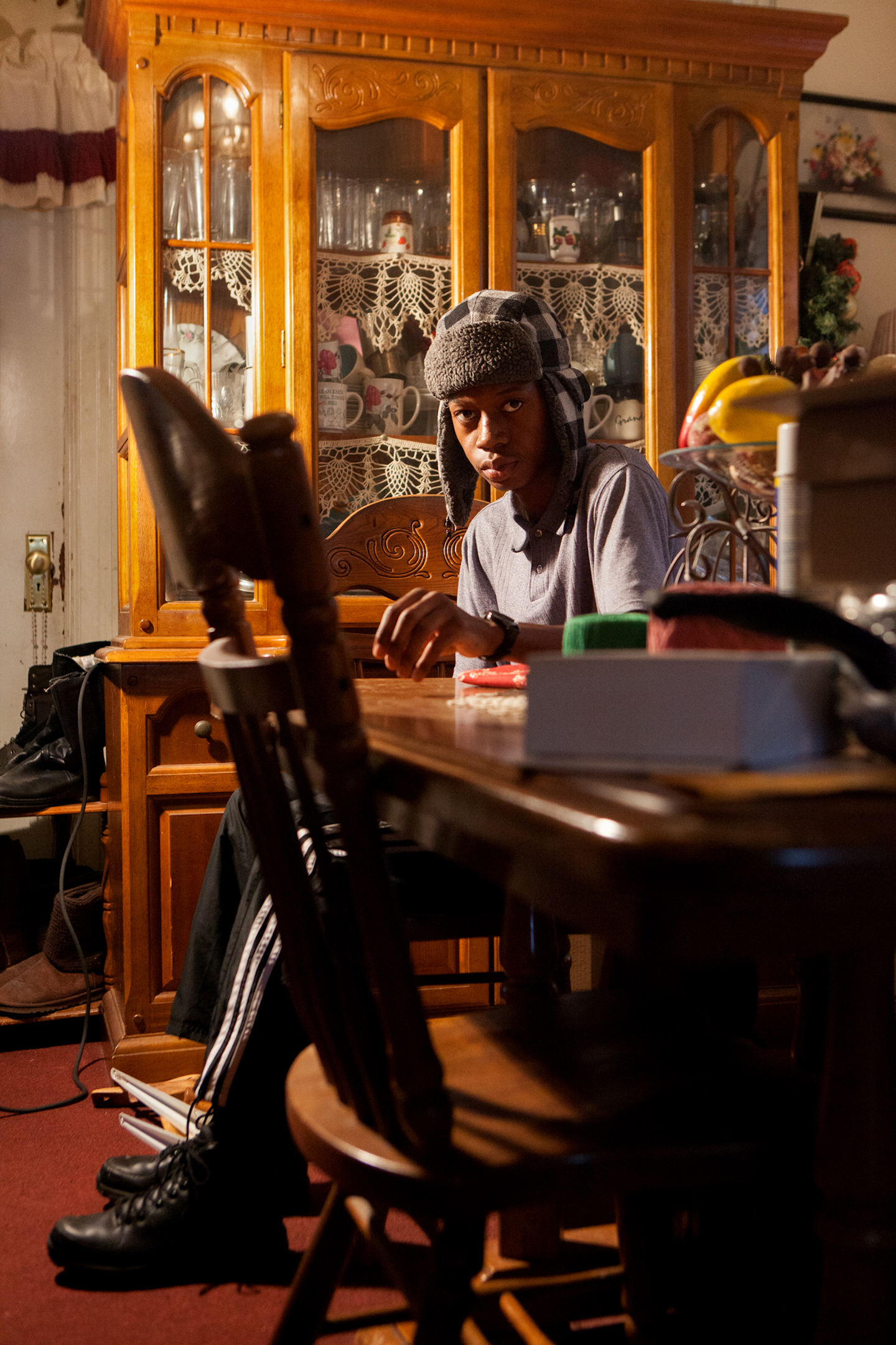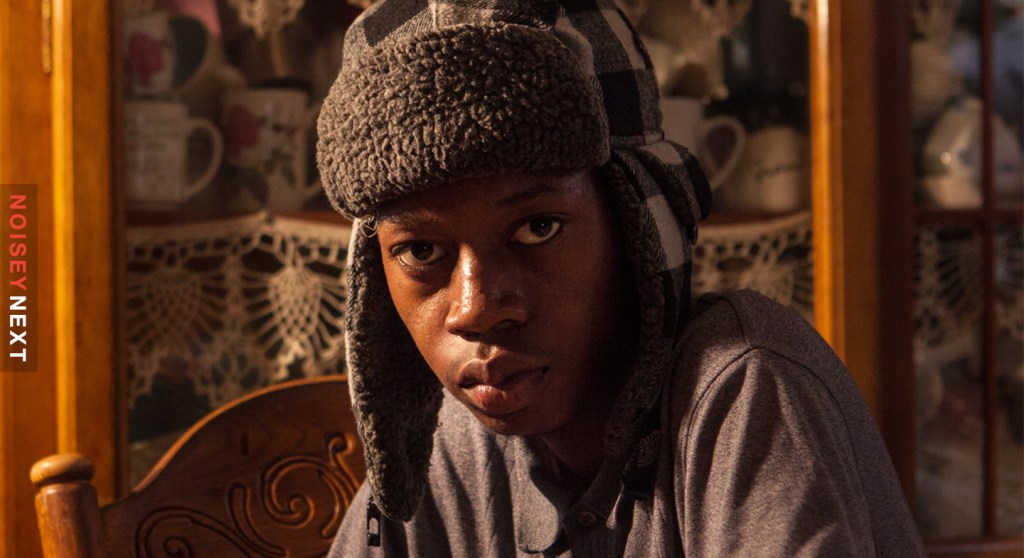The living room in Deem Spencer’s South Jamaica, Queens home has the familiarity of a black grandmother or auntie’s domain. Black angel figurines sit on the mantle, and the wooden china closet against the wall is fully stocked. There’s floral printed curtains, scattered laundry baskets, and, on the wall, a large photo of Barack Obama, just above a smaller one of Bill Clinton. The house is so quiet that even the air conditioner’s rumblings are noticeable.
When he shows me a chair to sit in, Deem warns me not to lean on its left arm too much. He grew up in this house, surrounded by these knick-knacks and decorations. Today, he’s wearing a cotton bucket hat, a polo, and gym shorts that fall to his mid thigh, which is the same exact size as his bony calves. When he speaks, his voice is calm and deep, a bit like how shrinks sound on TV. These surface level attributes wouldn’t lead you to believe that Deem is one of New York’s most exciting young rappers, but he is.
Videos by VICE
The expressiveness and confidence you don’t feel in Deem Spencer’s presence lives within his music. The songs he’s been self-releasing over the past two years are, at times, painfully vulnerable, with rapped and sung lyrics that invite you into detailed episodes of sadness and regret. With just over 3000 combined followers on Twitter and Instagram to his name, that repertoire of cerebral bars and harmonies is still unknown to most of the music world, though his days of floating around unnoticed feel numbered.

That’s partly because of Deem’s new EP, we think we alone, an eight-track project inspired by his experience caring for his ill grandfather, who died of kidney failure at the end of 2016. Deem assumed the position of caretaker last November, when other family members couldn’t afford to take off from work any longer. His days consisted of escorting his grandfather to doctor appointments, feeding him, bathing him, and generally making sure he had everything he needed. Around that time, after borrowing a keyboard from his girlfriend’s sister, he started to try his hand at producing his sophomore EP. “It was on some Randy Newman type shit,” Deem says of the early writing process. “A lot of minimalist piano-based sounds. I wasn’t trying to make a rap tape at all.” Though his grandfather’s death would pull him away from his production debut and finishing the project for a few months, the melancholy and reflective finished product would be a testament to his ability to translate the gloom of that period into music.
Deem Spencer was born in Brooklyn, but Jamaica, Queens is the only home he knows. When he was two years old, he and his mom moved to his grandparents’ place, a suburban-style single family home. His father was never around, but the house was still cramped. Until inheriting his grandfather’s bedroom last year, he never had one of his own, instead sleeping on the couch or the floor most nights. “It was not much space,” he smiles, handing me a glass of water. “But I had a backyard. I got a garden too.”
As a kid, when his mom was out of the house working, he’d spend time at home while his grandmother acted on her own creativity, crocheting and making dolls. “I was alone most of the time,” he tells me with an unenthusiastic shrug. “You can only relate to your grandmother so much; we didn’t have much in common. I would always be in my room writing or drawing or watching TV.”
Deem realized he had a gift with words when a third-grade poetry writing prompt led his teacher to praise his pen game. From that point, he’d lean on that skill whenever he needed a boost of confidence, volunteering for the occasional poetry competition in school. But it wasn’t until he found himself at a loss for words one day that finally he graduated to rapping.
“In ninth grade I liked this girl,” Deem tells me of his rap origin story. “My boy, he’s in our class, he’s rapping and we like the same girl. I look over one day, and he’s rapping to her. She’s feeling it, and I go over there, and I start rapping too. But I wasn’t rapping at the time, so I spit an Asher Roth verse. I knew I couldn’t keep rapping other niggas’ shit, so that’s when I actually started writing for myself.”
Feeling encouraged, Deem used his Christmas money the next winter to purchase a cheap mic, then took it to his friend Spencer’s house, where he and some friends would take their first shot at recording. Those intimate trial-and-error sessions, joining his penchant for poetry and new gift for spitting, have molded him into the contemplative artist he is now, with the help of regular producers Pip and Jachary.
His 2016 track “Soap,” from his debut EP, sunflower, details the shame of being swayed too easily by one’s peers in high school. On there, he raps with a speed just above a chilled lullaby, with lines like “Y’all niggas told me I’m a king, then you told me I’m a slave/ Then you told me I’mma win and you told me I’m afraid.” Paired with somber horn and piano riffs, his words perfectly encapsulate his regret and disappointment in himself for being so impressionable, as he explained to Pigeons and Planes earlier this year. Another song from that EP, “Tussilago,” recounts a fling in which he got too emotionally invested, over the kind of psychedelic synths and guitar strums that an early Frank Ocean could have sung over. Even before his grandfather got sick, his willingness to submerge himself into not-so-pleasant memories was striking. And so was his brevity, his ability to filter complicated feelings into compact, punctuated mental bursts. Of the 14 songs that appear on his two EPs, only three of them exceed three minutes.
Deem’s melodicism is centerstage on his sophomore EP. We think we alone’s “Moonflower,” sounds like it’s inspired by Mos Def’s crooning on “The Panties,”and shows Deem longing for his grandfather’s company. Rapping has been Deem’s preferred delivery, but on this body of work, he gives more space to singing in order to properly translate his sorrow. Even when he raps there’s a soothing melody in his delivery, not unlike acid jazz acts of the early 90s like Digable Planets. But it’d be hard to pin down just exactly what Deem Spencer is exactly, outside of a hauntingly transparent scribe.
The bulk of we think we alone—which is just 20 minutes long—finds the artist looking at life’s small moments more acutely, and attempting to make sense of the time he has left in the physical realm. “The Earth is flat, the dirt is black / The dirt is that from which the seed from birth is backed against the fence and left to grow then turn us back to seed,” he chronicles the circle of life on “Dirt.” On “The Bright Side,” he assures us that “We are not a mistake and we are not dead yet.” The EP’s lead single “Eve’s Titties,” features Deem wishing to be reincarnated as the leaf of a fig tree so he can land on the chest of the Christian world’s first lady and stop her from damning everyone to Hell.

But grief and sadness also play out in what Deem doesn’t say. The exaggerated strings on the EP’s intro foreground the project as a sort of play or movie, with each song serving as a chapter that ends exactly when his point has been driven home. “Look at the Bright Side” has no lyrics at all; instead, its collection of synths sounds evoke an outerspace organ solo at a Baptist church. “I didn’t wanna say too much,” he explains. “It’s more you can get out of it if I’m not telling you everything I’m feeling. If you can just feel the music between the words, it works.”
That track is framed as a moment of reflection following “Moonflower,” the only song that explicitly mentions his grandfather. There is when Deem’s separation anxiety says, To hell with witty punchlines and metaphors. Instead, he opens up about how life isn’t so sweet with one less loved one: “Our loved one left last Friday but he still get mail to the crib / How do I forward his checks to his new foreign address? / Move me. I wanna be next to him. I wanna be next / Even if it’s right now.”
No matter how much space he gives to instrumentation, the collection makes it clear that if something is festering in the Queens native’s mind, we’re probably going to hear about it in staggering detail. His ability to channel this energy into short, effective musical explorations of love, regret, and grief makes a case for him as one of rap’s most sophisticated young songwriters. It also places him as a purveyor of emotionally intelligent music, one that not only aids listeners in understanding his inner feelings, but in processing theirs.
After an hour of sitting in the frigid air conditioner wind, Deem takes me on a tour of the neighborhood. Right outside the door, we come face to face with his two closest friends: Spenser, a lean guy rocking the beginning stages of a fro and a red tee, and Malik, a tall, chubby dude who’s featured on we think we alone as Sly Cooper. They all give each other daps before we make our way. As he glides along the sidewalk, Deem seems to flit in and out of his own world, tilting his head downward when he’s not looking up to talk or laugh with his homeboys.
At the corner of 143rd Rd and 171st St, Spenser comes to a halt. “This is the moment when Deem’s grandma introduced both of us,” he says. The two met by chance as seven-year-old’s passing each other on the street, back when Deem’s grandmother used to walk him to school. “I was going this way and she was like, ‘What’s your name?’ I was like, ‘Spenser Williams.’ She said, ‘Spenser Williams, this is Deem Spencer.’ A year or two later, we were in the same class.”
Across the street from that initial meeting spot is a formerly abandoned house where the two used to make obstacle courses out of discarded objects. Walking down memory lane and pointing out around-the-way landmarks brings out a cheery side of Deem, who cracks smiles and jokes on Spenser and Malik. At points, though, he withdraws, shyly trying to keep Spencer from revealing something embarrassing. Still, the obstacle course memory breaks the ice—at least enough for Deem to let me in on some details about his grandad as the four of us make our way back to his house.
Specifically, he remembers a conversation he had with his grandfather last year, a few months before he moved back into the family house after a period spent crashing with friends. “There was one day in particular, where I came here and my grandfather looked at me and he saw I wasn’t healthy. He looked at my face.” Deem had been bouncing from place to place, and his need for rejuvenation was evident. “He just knew I wasn’t in a good place, so he gave me some tea. He grows tea in the backyard, like it’s still tea in the backyard.”

The memory inspires a half grin in Deem, because for most of his life, he and his grandfather had a complicated relationship. “We were never really tight,” he says, stopping to think. “Growing up, he always seemed mean. It seemed like he didn’t like me… Yeah, he always seemed cold towards me. And my grandfather was always close to everyone else. So I had to learn a lot about forgiveness. I had to not be selfish at all. It was the least selfish I’d ever been, because I had to make sure he was good.”
Many of today’s rising artists know grief too well. They name songs after fallen soldiers. They get names tatted on their bodies to memorialize the people they’ve lost. They hashtag the people they won’t get to speak to again. But few have been able to process these tragedies beyond saying “I miss you” or “RIP,” and antidepressants and painkillers are too often the go-to tools for coping. An artist like Deem Spencer sharing the complex nature of his grief feels like a needed encouragement for artists to ask themselves the necessary questions to deal with loss—in and outside of their music.
Deem Spencer doesn’t know what his next project will be about or what it will sound like. The keyboard that he got from his girlfriend’s sister was supposed to be for teaching himself how to start producing his own music. But life happened. And Deem’s never been one to ignore the noise inside of his head. Now that he’s put the pain of this past year into words, he’s free to move on to chronicling new memories. “It feels like a performance piece,” he says of we think we alone, before we part ways. “It’s all those feelings that I felt, but it’s just memory now. I don’t feel those things anymore. I just appreciate having vivid record of feelings I had.”
Lawrence Burney is a staff writer at Noisey. Follow him on Twitter.
Elliott Jerome Brown, Jr. is a Brooklyn-based photographer. Follow him on Instagram.
More
From VICE
-

Axelle/Bauer-Griffin/FilmMagic/Getty Images -

Screenshot: Six One Indie -

Photo: Rich Polk/Getty Images for iHeartRadio

